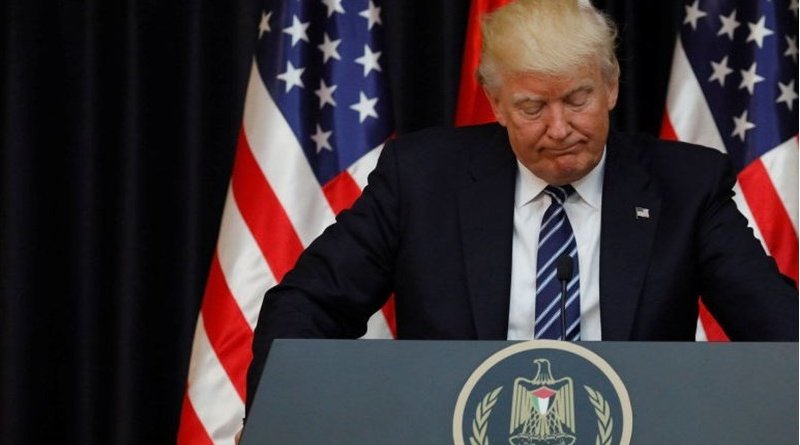Trump Must Choose Between Sanctions And Profit – OpEd
By Arab News
By Yasar Yakis*
US President Donald Trump last week held a 90-minute meeting with 45 Republican senators to discuss various aspects of the sanctions to be imposed on Turkey under the Countering American Adversaries Through Sanctions Act (CAATSA). “We expect,” the senators told Trump, “that you will follow the law and impose sanctions on Turkey without delay.” They added: “On a strong bipartisan basis, Congress has made it clear that there must be consequences for (Turkish President Recep Tayyip) Erdogan’s misguided S-400 acquisition,” referring to the air defense system that Turkey has purchased from Russia.
Trump still seems to be undecided and is going back and forth. This explains why the announcement of the decision on the suspension of Turkey’s participation in the F-35 jet fighter project was twice postponed.
The good news for Turkey from the White House meeting is that the senators were not able to persuade Trump to immediately impose the sanctions contained in CAATSA. The good news for the senators is that Trump did not outright reject their proposal. So things are at a standstill and the president is encouraging negotiations. He probably wants to honor the promise he made to Erdogan in Osaka, Japan, during the G20 meeting last month.
CAATSA provides that the president has to choose at least five out of 12 measures contained in the law. But these sanctions were originally introduced to punish Russia, Iran and North Korea. They include measures such as the denial of US visas for corporate officers at sanctioned entities, blocking loans and banking transactions from US financial institutions, and denying credit from the US Export-Import Bank to sanctioned individuals. Most of these sanctioned individuals are officials close to Russian President Vladimir Putin, so it has limited relevance to Turks.
The irony is that CAATSA was enacted to punish Russia, but ultimately it is Russia that benefits from the implementation of the law, because it succeeds in driving a wedge into the NATO solidarity. And it is NATO ally Turkey that is punished at the end of the day.
NBC news correspondents Leigh Ann Caldwell, Carol E. Lee and Courtney Kube reported, in a podcast on July 24, that Trump tried to convince the senators to give him space to cut a deal with Erdogan instead of adopting sanctions. One senator said Trump “believed he can use his relationship with Erdogan to come to a solution that would better rein in Turkey than any sanction would.”
The NBC correspondents also wrote that Erdogan, during his meeting with Trump in Japan, made flattering comments about the US president’s image as a seasoned deal-maker, but also used less than flattering words by referring to a retaliation if the US moved forward with the sanctions, including ending the US military presence at Turkey’s Incirlik Air Base, which has been critical to the American military operations in Syria.
Erdogan told the Turkish media, on his way back from Osaka, that the US would deliver the F-35 super fighters despite Senate opposition. He must have guessed that, as a successful businessman, Trump would find a way not to spoil this opportunity for the American defense industry. It remains to be seen whether Erdogan’s guess will materialize.
One of the possible outcomes is that Erdogan strikes a deal with Trump to keep in store the S-400 air defense system and dispel US worries that the system could identify the weaknesses of the F-35s. Such a deal would lift the US administration’s decision to suspend Turkey’s participation in the F-35 project and open the way for Ankara to purchase US patriot missiles. By so doing, both leaders would be killing several birds with one stone.
If this scenario materializes, Turkish taxpayers will fork out $2.5 billion for an air defense system that will not be used. Moscow may not like it, but will probably not object, because the price of the equipment will be paid by Turkey.
Trump invited only the Republican senators to the White House, but the reaction to Turkey’s purchase of the Russian-made missile system is bipartisan. In fact, Democrat Sens. Jack Reed and Bob Menendez, the chairman of the Senate Foreign Relations Committee, joined with Republicans Jim Inhofe and Jim Risch to say: “Erdogan has chosen a perilous partnership with the Russian President Vladimir Putin at the expense of Turkey’s security, economic prosperity and the integrity of the NATO alliance.”
If Trump yields to the senators’ pressure, he may choose to impose the sanctions that will have the least or no harmful effects on Turkey. The choice will, therefore, be between the US senators’ negative feelings about Turkey and the profit that the US defense industry expects from the Turkish market.
- Yasar Yakis is a former foreign minister of Turkey and founding member of the ruling AK Party. Twitter: @yakis_yasar

